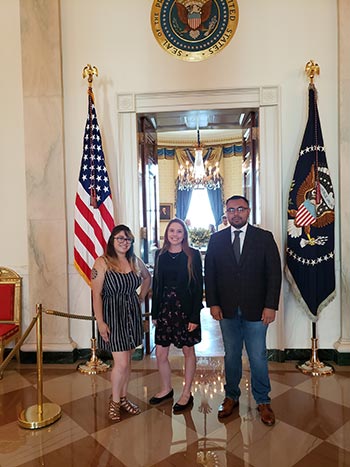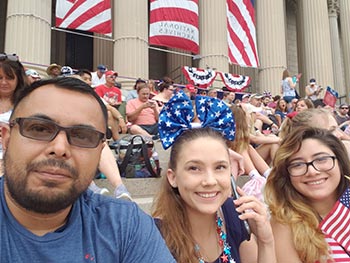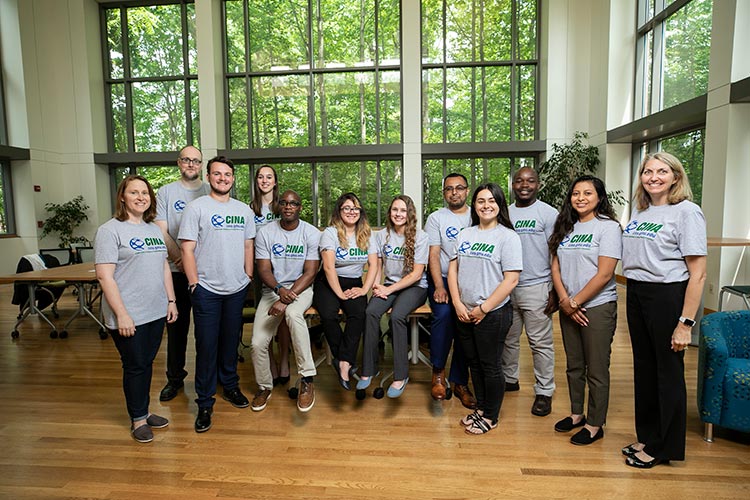Dr. Omar Camarillo, an assistant professor of criminal justice at Eastern New Mexico University, and ENMU students Cecilia Torres and Xandra James recently participated in the Department of Homeland Security's Summer Research Team Program for Minority Serving Institutions at George Mason University in Fairfax, Virginia.
The group members shared details about their time in the program for the ENMU News:

Dr. Omar Camarillo
How did you get involved in the Summer Research Team Program?
I got involved in the DHS-ORISE SRT program through an email that was forwarded to me by Dr. Dale Streeter. I applied for the SRT program by submitting a proposal along with my application and the name of two students, Cecilia Torres and Xandra James. It was a very competitive process. We went through three phases before getting selected for the SRT program by DHS and CINA (Criminal Investigations and Network Analysis), a DHS Center of Excellence.
This was my first time in participating in the DHS-ORISE SRT program, and I would definitely encourage other faculty at ENMU to apply and give their students a hands-on approach to research and working with the federal government.
Describe your experience in the program.
I have had a great experience in the DHS-ORISE SRT program. It was a great pleasure to be around a supportive group of individuals who have similar research agendas and who have an interest in the U.S.-Mexico border. We had wonderful mentors in Anthony Stefanidis, Arie Croitoru, Ron Mahabir, Jacek Radzikowski and Andrew Crooks and the guidance from the Kerry Riddle and Stu McKenzie and the rest of the CINA staff that made us feel right at home.
We added some important and crucial tools to our repertoires such as conducting network analysis, using software such as Gephi, QDA Miner, MAXQDA and ArcGIS. We were provided with the opportunity to attend lectures from some of the world's leading experts on human trafficking, networking analysis, forensic and digital forensic science, and cryptocurrency.
My students had a once in a lifetime opportunity to serve an appointment as affiliate faculty at George Mason University and with DHS-ORISE. It was an honor to serve as a mentor to Cecelia Torres and Xandra James throughout the whole process. I could not have asked for any two better students from ENMU to call my team members and family. Not that many people could handle a high-pressure situation of an R1 university and federal government standards. We pushed ourselves to the limit working 40-plus work weeks and accomplishing original research in less than ten weeks.
It was not all work and no play; we took the weekends off to explore D.C. and Virginia. We got to spend Memorial Day laying roses at Arlington National Cemetery, the Fourth of July in D.C. at the National Archives and the National Mall, and we we took tours of the White House, the Capitol and the Supreme Court.
On July 31, we got to present our research findings to DHS leaders at the DHS-COE Summit. Overall, it was a wonderful opportunity for me and my students, and we would like to thank DHS-ORISE and CINA at George Mason University for allowing us this opportunity.
Tell us about your research.
Our research topic focuses on the perceptions that the news media, politicians and the general public share on social media (Twitter) regarding the ties between U.S.-based gangs and Mexican Drug Trafficking Organizations (DTOs). We were also interested in the perceptions that the public and the media hold regarding drug-related spillover violence. Gang and cartel violence are a very prevalent issue that is currently affecting government policy, and much of public perceptions of these criminal organizations. Residing in border states, we have noticed that posts on social media platforms have not been an accurate representation of real-life events in border towns, cities and states.
What did you and your students learn from the program?
We learned what cutting edge research and social issues are being conducted and funded by DHS. It allowed us to build a network with key researchers, experts and DHS personal who want to keep the partnership between CINA at George Mason University and Eastern New Mexico University. We learned and developed some key skills such as ArcGIS, QDA Miner, digital forensics and Gephi.
How will you bring those lessons back to ENMU?
These lessons and skills that I learned will be implemented in my "CJ 301 Comparative Criminal Justice" and "CJ 404 Border Crime" courses. I will teach students how to utilize these software platforms and how to collect and analyze their own data. This will help them become more marketable if they are interested in federal employment.
How does this program impact students in their academic careers and prepare them for their future careers?
This program will impact students' academic careers by making them more effective and efficient researchers. The DHS SRT program provided me with information about internships that lead to non-competitive jobs with the Federal government for students at ENMU. There is the opportunity for me to apply for additional funding from DHS-ORISE to conduct additional research which would allow me to train and hire additional students and provide them with the hands-on experience that is needed to succeed in a government job or graduate school.

Cecilia Torres
What is your major and classification?
I am a junior double majoring in forensic science and criminal justice.
How did you get involved in the Summer Research Team Program?
Dr. Camarillo proposed the research opportunity to his classes. I interviewed with him and then applied to the program directly. Several weeks later, we found out that our team would be hosted at George Mason University.
Describe your experience in the program.
The experience has been great. Everyone working for the Crime Investigative Network Analysis Center is incredibly friendly and welcoming. It's been a real eye-opener to do hands-on work in my field, such as coding and data analysis. This program has allowed me to see what research really entails, and I thoroughly enjoy it. Also, we were able to go to D.C. every weekend and experience big city living in our Nation's Capital.
Which skills did you acquire or strengthen from participating in the program?
Through this, I became proficient in using software, like QDA miner, used to code and generate quantitative data and run geospatial analysis. I also got to go through the entire research process and strengthen my report writing. We were also able to attend lectures from federal employees and learned a lot about topics such as forensics/digital forensics, human trafficking and financial crimes.
What was your favorite part of the program?
My favorite part of the program was meeting so many people from diverse backgrounds and different expertise. I got to develop close personal relationships with them and my team, Dr. Camarillo and Xandra James. This program was a fantastic opportunity to network. I also enjoyed studying cartel violence and border crimes, two topics I am personally very passionate about.

Xandra James
What is your major and classification?
I am a double major in criminal justice and sociology with a minor in psychology. I am a senior set to graduate in December of this year.
How did you get involved in the Summer Research Team Program?
Dr. Camarillo informed his students of this opportunity and told those eligible with meeting the program's requirements that they should consider applying. I was among those students and decided to give it a shot. I applied to the program, submitted the appropriate paperwork and waited to see if I got it. Dr. Camarillo informed me of my acceptance into the program, as did a congratulatory email from the Department of Homeland Security.
Describe your experience in the program.
My experience in this program is one that I wouldn't have been able to have elsewhere. The faculty here at George Mason University are very supportive of our research with both funding and teaching us the skills we need to complete our research and put it up for evaluation to be published. Aside from the research benefits, I also got to explore Washington D.C. every weekend and experience groundbreaking American history with my own eyes.
Which skills did you acquire or strengthen from participating in the program?
The most important skill I learned was how to work with a large data set. I learned how to code each piece of data in an efficient way and how to represent that data on geospatial maps, frequency charts and word clouds. I also learned how to get around in the big city using the metro and other forms of public transportation. I feel that this program also refined my skills in regard to my own presentation and interaction in professional settings.
What was your favorite part of the program?
My favorite part of the program was being able to get a taste of what careers are out there after college and what they entail. Along with that, I met plenty of established individuals working in the fields of criminal justice and forensics willing to share their knowledge. These individuals worked cases like the Oklahoma City bombing and the Green River Killer case. There is great value in establishing networks with people who hold the positions you are working to achieve.




